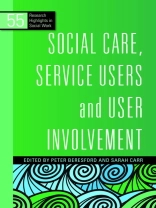Social Care, Service Users and User Involvement provides a definitive introduction to practical, philosophical and theoretical issues at the heart of user involvement.
This book provides an accessible account of the latest research findings regarding user involvement on three levels: the delivery and provision of services, practice and practitioners, and research and evaluation. It explores a wide range of service user needs and concerns, including the latest developments in personalisation and the effect of the Equality Act 2010. First-hand accounts illustrate the range of issues and service user needs which could be addressed by increased involvement within and beyond the social care system. The book also distinguishes between user views and user involvement, and addresses their processes outcomes and impact, as well as their measurement.
This book will be a key source of information for care workers, service managers, policy makers, researchers, service users and social and health care professionals involved in social care and support service planning.
Table des matières
Foreword. Simon Denegri, INVOLVE, UK. Introduction. 1. The Theory and Philosophy Behind User Involvement. Peter Beresford, Brunel University, UK. 2. Participation, Resistance and Change: Examining Influences on the Impact of Service User Participation. Sarah Carr, Social Care Institute for Excellence, UK. 3. Service User Involvement — What It Is and What It Could Be: Lessons from the Standards We Expect Project. Jennie Fleming, Centre for Social Action, De Montfort University, UK. 4. Reclaiming Community Work for Involvement in Social Care. Martin Hoban, WRVS Wellbeing Project, UK. 5. Rainbow Quality System: User Led Innovation in Quality Assurance. Arne Kristiansen, Lund University, Sweden. 6. Co-production in Evaluation and Outcomes: Lessons from Working with Older People in Designing and Undertaking Research Initiatives on Older People’s Lives, Independence and Wellbeing. Helen Bowers and Anita Wilkins, National Development Team for Inclusion, UK. 7. Involving Ethnically Diverse Service Users In the Research Process: Alliances and Action. Karen Newbigging, University of Central Lancashire, UK, Alastair Roy, University of Central Lancashire, Zemikael Habte-Mariam, independent researcher, Mick Mc Keown, University of Central Lancashire and Beverley French, University of Central Lancashire. 8. Researching Continuity of Care in Mental Health: What Difference Does Holding a Survivor Research Identity Make? Angela Sweeney, University College London, UK. 9. Involving a Marginalized Group in Research and Analysis: People with Life Limiting Conditions — Issues and Gains. Philip Cotterell, Southampton University, UK and Mandy Paine, service user and campaigner. 10. The Key Contribution of User-Led Services: What the Evidence Tells Us. Colin Barnes, University of Leeds, UK. 11. No Blame, No Shame: Towards a Social Model of Alcohol Dependency — A Story from Emancipatory Research. Patsy Staddon, University of Plymouth, UK. 12. ‘There’s no point in doing research if no one wants to listen’: Identifying LGBT Needs and Effecting ‘Positive Social Change’ for LGBT people in Brighton and Hove. Kath Browne, University of Brighton, UK, Leela Bakshi, activist researcher and Jason Lim, Queen Mary’s, University of London, UK. 13. Involving Children and Young People in Research: Principles into Practice. Louca Mai-Bradey, National Children’s Bureau, UK, Ciara Davey, Which? Magazine, Catherine Shaw, National Children’s Bureau and Rachel Blades, National Children’s Bureau. 14. Involving People with Learning Difficulties and Self-Advocacy. Maggie Brennan, Victor Forrest and Jennifer Taylor, People First Lambeth Research Group. Conclusion. The Personal is Still Political. Peter Beresford and Sarah Carr. Index.












